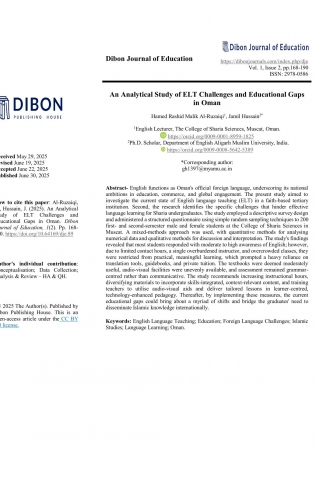
Abstract- English functions as Oman's official foreign language, underscoring its national ambitions in education, commerce, and global engagement. The present study aimed to investigate the current state of English language teaching (ELT) in a faith-based tertiary institution. Second, the research identifies the specific challenges that hinder effective language learning for Sharia undergraduates. The study employed a descriptive survey design and administered a structured questionnaire using simple random sampling techniques to 200 first- and second-semester male and female students at the College of Sharia Sciences in Muscat. A mixed-methods approach was used, with quantitative methods for analysing numerical data and qualitative methods for discussion and interpretation. The study's findings revealed that most students responded with moderate to high awareness of English; however, due to limited contact hours, a single overburdened instructor, and overcrowded classes, they were restricted from practical, meaningful learning, which prompted a heavy reliance on translation tools, guidebooks, and private tuition. The textbooks were deemed moderately useful, audio-visual facilities were unevenly available, and assessment remained grammarcentred rather than communicative. The study recommends increasing instructional hours, diversifying materials to incorporate skills-integrated, context-relevant content, and training teachers to utilise audio-visual aids and deliver tailored lessons in learner-centred, technology-enhanced pedagogy. Thereafter, by implementing these measures, the current educational gaps could bring about a myriad of shifts and bridge the graduates' need to disseminate Islamic knowledge internationally.
...